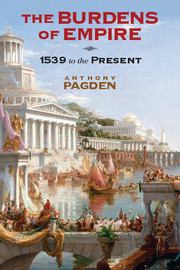Book contents
- Frontmatter
- Dedication
- Contents
- Preface
- Acknowledgements
- Introduction: Anatomy of Empire from Rome to Washington
- 1 Defending Empire: The School of Salamanca and the ‘Affair of the Indies’
- 2 ‘Making Barbarians into Gentle Peoples’: Alberico Gentili on the Legitimacy of Empire
- 3 The Peopling of the New World: Ethnos, Race, and Empire in the Early-Modern World
- 4 Conquest, Settlement, Purchase, and Concession: Justifying the English Occupation of the Americas
- 5 Occupying the Ocean: Hugo Grotius and Serafim de Freitas on the Rights of Discovery and Occupation
- 6 Cambiar su ser: Reform to Revolution in the Political Imaginary of the Ibero-American World
- 7 From the “Right of Nations” to the “Cosmopolitan Right”: Immanuel Kant's Law of Continuity and the Limits of Empire
- 8 “Savage Impulse-Civilized Calculation”: Conquest, Commerce, and the Enlightenment Critique of Empire
- 9 Human Rights, Natural Rights, and Europe's Imperial Legacy
- Bibliography
- Index
2 - ‘Making Barbarians into Gentle Peoples’: Alberico Gentili on the Legitimacy of Empire
Published online by Cambridge University Press: 05 March 2015
- Frontmatter
- Dedication
- Contents
- Preface
- Acknowledgements
- Introduction: Anatomy of Empire from Rome to Washington
- 1 Defending Empire: The School of Salamanca and the ‘Affair of the Indies’
- 2 ‘Making Barbarians into Gentle Peoples’: Alberico Gentili on the Legitimacy of Empire
- 3 The Peopling of the New World: Ethnos, Race, and Empire in the Early-Modern World
- 4 Conquest, Settlement, Purchase, and Concession: Justifying the English Occupation of the Americas
- 5 Occupying the Ocean: Hugo Grotius and Serafim de Freitas on the Rights of Discovery and Occupation
- 6 Cambiar su ser: Reform to Revolution in the Political Imaginary of the Ibero-American World
- 7 From the “Right of Nations” to the “Cosmopolitan Right”: Immanuel Kant's Law of Continuity and the Limits of Empire
- 8 “Savage Impulse-Civilized Calculation”: Conquest, Commerce, and the Enlightenment Critique of Empire
- 9 Human Rights, Natural Rights, and Europe's Imperial Legacy
- Bibliography
- Index
Summary
I
The great debates over the status and nature of what later came to be called international law may be said to have begun, as we have seen, with an attempt by some of the members of the School of Salamanca to reconfigure the law of nations so as to provide a normative justification for the Spanish presence in America. Francisco de Vitoria's arguments had, of course, been intended to be applicable to all nations everywhere. However, the specific conditions with which the School was primarily concerned were narrowly defined by the circumstances of the Spanish “discovery” and the peoples they had discovered. The first writer to bring some of the arguments which Vitoria in particular had identified to bear on the wider issue of the justification for universal empire was the Italian jurist Alberico Gentili.
Gentili was born in the town of San Ginesio in the Marche in central Italy in 1552. In 1580, having converted to Protestantism, he fled first to the relative safety of Ljubljana and then to Germany. He arrived in England in 1580, by which time he had acquired a considerable international reputation and, in 1587, was appointed Regius Professor of Civil Law at Oxford. He joined Gray's Inn in 1600 and in 1605 was appointed advocate for the interests of the Spanish Crown in cases before the Admiralty Court. Gentili wrote widely on a number of related topics, a defence of the traditional method of legal exegesis, the mos Italicus against the new humanist mos Gallicus (De iuris interpretibus dialogi sex), a treatise on embassies (De legationibus), a collection of reflections on his experiences as advocate for the Spanish Crown (Hispanicae advocationis libri duo), and a dialogue on the justice of Roman imperial expansion, The Wars of the Romans (De armis Romanis).
The best-known and by far the most influential of his writings, however, was On the Laws of War (De iure belli), which first appeared in 1598.
- Type
- Chapter
- Information
- The Burdens of Empire1539 to the Present, pp. 75 - 96Publisher: Cambridge University PressPrint publication year: 2015

